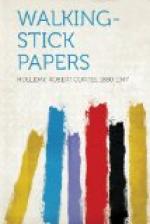I stood my battered shilling ash stick in a corner and looked out again from my window over the old red roofs and at the back of the house where he dwelt who when the Queen had commanded his presence said, “I’m an old man, ma’am, and I’ll take a seat.” When Annie, the maid, had brought my “shaving water, sir,” in a kind of a tin sprinkling can and when I had used it I took up my Malacca town cane and went out to see how old Father Thames was coming on.
I thought I would buy some writing paper and I went into a drug store kind of a place. “I see you are an American, sir,” said the shopman. “This is a chemist’s shop,” he explained; “you get paper at the stationer’s, just after the turning, at the top of the street.”
Hurrying for my passport, I inquired as to the location of such and such a street—whatever the name of it is—where, I understood, the place was where this was to be had. “Ah!” said he whom I addressed, “you want the American Consul-General.”
X
WHY MEN CAN’T READ NOVELS BY WOMEN
George Moore once presented the idea that the only thing of interest and value about the creative art of a woman was the feminine quality of that art. The novels of Jane Austen come readily to mind as an argument in support of this provocative idea. Quite first among their charms, every one will admit, is the indisputable fact that no man could possibly have written them. They have the lightness, brightness, sparkle, perfume, flavour, grace, fun, sensitivity of a young feminine mind. No one more than Miss Austen has captivated the roarers among men. A man admires, say, Conrad. He—if he is a manly man—falls in love with Jane Austen. Very well.
Now, then, it is a curious and a paradoxical thing that no man of masculine character can read the novels written by women to-day, unless he has to; that is, unless he is a book-reviewer, publisher’s reader, magazine editor, proofreader, or some such thing. And the reason he can’t do it, in view of George Moore’s idea and Miss Austen’s renowned magnetism, is curious indeed. It is because of the peculiarly feminine attitude of mind of our present women-novelists. At least, this is the arresting pronouncement delivered with much robust eloquence by my leonine friend, Colonel Bludgeon.
The present writer (a pale, spectacled, middle-aged young man) is too conscious of the wondrous nature of women to question their ability in anything. But of one of whom he stands in greater awe than of anything else in the world he is a humble friend. The dictum of this my friend comes from a quite different character than myself. He is a great man; he has read everything; seen everything; known everybody. Exception to him could be taken only on one ground. He is perfectly awful. He belongs to an old school; splenetic, choleric. He is Sir-Anthony-Absolute-like; a critic in the spirit of the thundering days of William Ernest Henley. His face is like a beefsteak. His frame is like “a mountain walking.” His voice, Johnsonian. He knows more about literature than probably any other living man.




